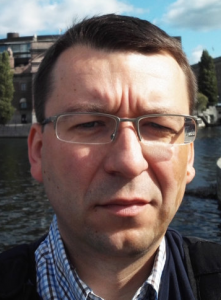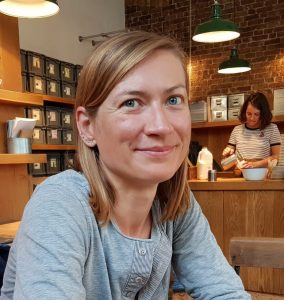Na najbliższym spotkaniu seminarium, 19. kwietnia (czwartek), będziemy mieli przyjemność gościć dwójkę wybitnych neoinstytucjonalistów – Sabinę Siebert (University of Glasgow) oraz Roya Suddaby (University of Victoria, Newcastle University), którzy nawiążą dialog w ramach dwóch zaproponowanych wystąpień, zatytułowanych: „Craft, Magic and the Re-enchantment of the World” (Roy Suddaby) oraz „Enchantment, emplacement and secrecy in an elite profession: An institutional perspective” (Sabina Siebert). Abstrakty obu wystąpień zamieszczamy poniżej.
Spotkanie odbędzie się tradycyjnie w sali seminaryjnej ISP PAN (Polna 18/20), początek o godzinie 13:00. Językiem spotkania będzie angielski.

Sabina Siebert / University of Glasgow (gla.ac.uk)
Sabina Siebert jest profesorem zarządzania w Adam Smith Business School, University of Glasgow, autorką kilkudziesięciu publikacji m.in. z zakresu zarządzania zasobami ludzkimi, socjologii organizacji i teorii organizacji. W latach 2015-2017 pełniła rolę redaktora naczelnego European Management Journal. Swoją karierę naukową rozpoczynała na Uniwersytecie Łódzkim. (bio na stronie UG)

Roy Suddaby / University of Victoria
Roy Suddaby jest profesorem zarządzania Peter B. Gustavson School of Business, University of Victoria (Kanada) oraz Newcastle University Business School (UK) i jednym z najczęściej cytowanych autorów wśród badaczy zajmujących się nowym instytucjonalizmem. Thompson Reuters przez trzy lata z rzędu (2014-16) zaliczał go do grona World’s Most Influential Scientific Minds (h-indeks=37). Jego koncpecje, m.in. pracy instytucjonalnej, na trwałe weszły do kanonu teorii neoinstytucjonalnej. (bio)
Abstrakt referatu „Craft, Magic and the Re-enchantment of the World” (Roy Suddaby)
The great German sociologist Max Weber famously linked the emergence of capitalism to the somewhat more secularist tendencies of Calvinist Protestantism. Weber also predicted that the modern shift to industrial capitalism would be accompanied by an increasing rationalization of society in modernity, which he termed the „disenchantment of the world”. Weber used the term to capture a sense of weary nostalgia for what humanity must give up in order to progress, or to capture what was lost when science replaced myth, industry supplanted craft and our local communities and tribal sense of belonging are abandoned by our pursuit of global society. Weber’s notion of rationalization and disenchantment has formed the foundation of many substantive schools of organization, including institutional theory and critical theories of management.
In this talk, I challenge Weber’s notion of disenchantment by presenting a range of phenomena, which suggests a contemporary rejection of secularism, scientific rationality and the industrial domination of the mystery of nature. The resurgence of fundamentalist religion, the increasing rejection of global social structures like the nation state, the multinational corporation and global trade agreements and the increased interest in populist tribalism in politics all speak to an oppositional counter narrative of an increasing appetite for „enchantment”. Not all of these trends are so negative. Powerful social movements advocating slow food, farmer’s markets and humane treatment of animal stock all offer a useful counterpoint to the oft predicted ‘McDonaldization’ of the food industry. The re-emergence of craft modes of production and the strength of family business also contradict the assumptive industrialization of the world. Collectively, these examples raise questions about the validity of Weber’s theory of disenchantment. The purpose of this talk is to draw together the threads of a competing discourse that elaborates both the positive and negative possibilities of re-enchanting the world.
Artykuł: R. Suddaby, M. Ganzin, A. Minkus (2017) Craft Magic and the Re-enchantment of the World.
Abstrakt referatu: „Enchantment, emplacement and secrecy in an elite profession: An institutional perspective” (Sabina Siebert)
This paper contributes to the literature on maintenance of institutions through an interpretive ethnographic study of an elite professional institution, the Faculty of Advocates (Scottish barristers). My interest in the Faculty was motivated by the research question: how has this institution, which has been in existence for over five hundred years and located in the same building for over three hundred years, retained its form despite pressures for endogenous and exogenous change? In the paper I analyze practices within the Faculty such as customs, ceremonies, rituals, seating arrangements and dress code the with a view to determining how they help maintain professional closure, and reproduce the status order within the Scottish legal system. To do so, I draw on theoretical concepts from institutional theory and the literature on organizational spaces. In particular, my approach to the micro-foundations of institutional maintenance is cognizant of the ‘situatedness’ of practice within a set of institutionalized rules.
Artykuł: S. Siebert, F. Wilson, J.R.A. Hamilton (2017) „Devils May Sit Here:” The Role of Enchantment in Institutional Maintenance.
 instytucjonalnej modelu szwedzkiego” wygłosi Sławomir Czech (Uniwersytet Ekonomiczny w Katowicach), badacz tzw. modelu szwedzkiego (często traktowanego jako kanoniczny przypadek realizacji idei „trzeciej drogi”), autor książki: „Od konfliktu do kooperacji. Instytucjonalizacja konfliktu interesów zbiorowych w szwedzkim modelu gospodarczym” (Scholar, 2019). Zapraszamy do lektury
instytucjonalnej modelu szwedzkiego” wygłosi Sławomir Czech (Uniwersytet Ekonomiczny w Katowicach), badacz tzw. modelu szwedzkiego (często traktowanego jako kanoniczny przypadek realizacji idei „trzeciej drogi”), autor książki: „Od konfliktu do kooperacji. Instytucjonalizacja konfliktu interesów zbiorowych w szwedzkim modelu gospodarczym” (Scholar, 2019). Zapraszamy do lektury  rozszerzonego abstraktu wystąpienia [LINK]. Pierwszy głos w dyskusji zabierze Zofia Łapniewska z Katedry Ekonomii Instytucjonalnej i Polityki Gospodarczej na Uniwersytecie Jagiellońskim.
rozszerzonego abstraktu wystąpienia [LINK]. Pierwszy głos w dyskusji zabierze Zofia Łapniewska z Katedry Ekonomii Instytucjonalnej i Polityki Gospodarczej na Uniwersytecie Jagiellońskim.
 zatytułowany „Jak opisać dynamikę polityczną polskiej transformacji? Hipoteza ruchu dwukierunkowego Karla Polanyiego” wygłosi Maciej Kassner (Instytut Filozofii UMK), kierownik projektu podoktorskiego „Rynek i polityka” realizowanego w ramach konkursu FUGA (NCN).
zatytułowany „Jak opisać dynamikę polityczną polskiej transformacji? Hipoteza ruchu dwukierunkowego Karla Polanyiego” wygłosi Maciej Kassner (Instytut Filozofii UMK), kierownik projektu podoktorskiego „Rynek i polityka” realizowanego w ramach konkursu FUGA (NCN). 








